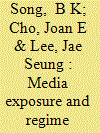| Srl | Item |
| 1 |
ID:
151580


|
|
|
|
|
| Summary/Abstract |
Despite strict state controls, negative news about local officials is reported in China. Faced with political constraints and the incentive and pressure to earn profits, municipal television news programmes have developed and adopted the life news model (minsheng xinwen), which aims to help citizens solve problems. The production process of this news model has transformed the political role of the broadcast media at the local level. Many life news reports focus on disputes between citizens and local officials. Thus, addressing citizen grievances essentially facilitates public service provision. Based on an ethnographic case study of a municipal television news programme, this article finds that the production process of life news reports can facilitate public service provision by correcting local officials’ behaviour, regardless of whether the news reports are eventually broadcast. This unintended role is a result of the power negotiation between local officials and journalists who face immense commercial pressure.
|
|
|
|
|
|
|
|
|
|
|
|
|
|
|
|
| 2 |
ID:
153317


|
|
|
|
|
| Summary/Abstract |
This study explores whether and how exposure to mass media affects regime support in competitive authoritarian regimes. Using geographical and temporal variation in newspaper circulation and radio signal strength in South Korea under Park Chung Hee's competitive authoritarian rule (1961–1972), we find that greater exposure to media was correlated with more opposition to the authoritarian incumbent, but only when the government's control of the media was weaker. When state control of the media was stronger, the correlation between media exposure and regime support disappeared. Through a content analysis of newspaper articles, we also demonstrate that the regime's tighter media control is indeed associated with pro-regime bias in news coverage. These findings from the South Korean case suggest that the liberalizing effect of mass media in competitive authoritarian regimes is conditional on the extent of government control over the media.
|
|
|
|
|
|
|
|
|
|
|
|
|
|
|
|